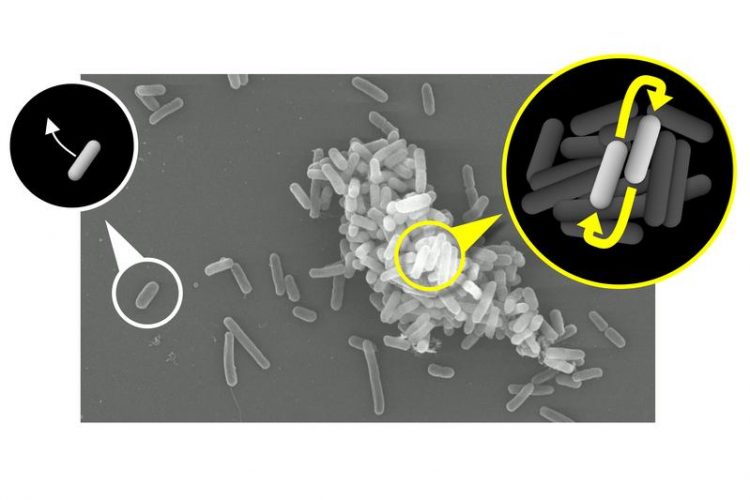How does cooperation evolve? Researchers at Osnabrueck University unravel why organisms frequently help each other

Positive feedbacks favour cooperative bacteria, which are part of a multicellular group (right). In contrast, individual bacterial cells that try to help others (left) do not benefit. Department of Ecology Osnabrueck University
Interactions between two or more organisms, in which all partners involved gain an advantage, are ubiquitous in nature and have played a key role in the evolution of life on Earth. For example, root bacteria fix nitrogen from the atmosphere, thus making it available to plants. In return, the plant supplies its root bacteria with nutritious sugars.
However, it is nevertheless costly for both interaction partners to support each other. For example, the provision of sugar requires energy, which is then not available to the plant anymore. From this results the risk of cheating interaction partners that consume the sugar without providing nitrogen in return.
The research team led by Prof. Dr. Christian Kost used bacteria as a model system to study the evolution of mutual cooperation. At the beginning of the experiment, two bacterial strains could only grow when they provided each other with essential amino acids.
Over the course of several generations, however, the initial exchange of metabolic byproducts developed into a real cooperation: both partners increased the production of the exchanged amino acids in order to benefit their respective partner.
Even though the increased amino acid production enhanced growth when both partners were present, it was extremely costly when individual bacterial strains had to grow without their partner.
The observed changes were caused by the fact that individual bacterial cells had assembled into multicellular clusters. In these cell groups, cooperative mutants were rewarded. The more resources they invested in the growth of other cells, the more nutrients they received in return from their partners.
“This kind of feedback represents a previously unknown mechanism, which promotes the evolution of cooperative interactions between two different organisms,” says Prof. Dr. Christian Kost, leader of the study. Although the study was performed with bacteria in a test tube, the mechanism discovered can most likely explain the evolution of cooperation in many different ecological interactions.
Prof. Dr. Christian Kost, Universität Osnabrück
Department of Ecology
School of Biology/ Chemistry
Barbarastraße11, 49076 Osnabrück
Tel.: +49 541 969-2853
E-Mail: christian.kost@uni-osnabrueck.de
Original Publication:
Preussger, D., Giri, S., Muhsal, L., Oña, L., Kost, C. (2020). Reciprocal fitness feedbacks promote the evolution of mutualistic cooperation. Current Biology, DOI: 10.1016/j.cub.2020.06.100
https://doi.org/10.1016/j.cub.2020.06.100
Media Contact
All latest news from the category: Life Sciences and Chemistry
Articles and reports from the Life Sciences and chemistry area deal with applied and basic research into modern biology, chemistry and human medicine.
Valuable information can be found on a range of life sciences fields including bacteriology, biochemistry, bionics, bioinformatics, biophysics, biotechnology, genetics, geobotany, human biology, marine biology, microbiology, molecular biology, cellular biology, zoology, bioinorganic chemistry, microchemistry and environmental chemistry.
Newest articles

Pinpointing hydrogen isotopes in titanium hydride nanofilms
Although it is the smallest and lightest atom, hydrogen can have a big impact by infiltrating other materials and affecting their properties, such as superconductivity and metal-insulator-transitions. Now, researchers from…

A new way of entangling light and sound
For a wide variety of emerging quantum technologies, such as secure quantum communications and quantum computing, quantum entanglement is a prerequisite. Scientists at the Max-Planck-Institute for the Science of Light…

Telescope for NASA’s Roman Mission complete, delivered to Goddard
NASA’s Nancy Grace Roman Space Telescope is one giant step closer to unlocking the mysteries of the universe. The mission has now received its final major delivery: the Optical Telescope…



